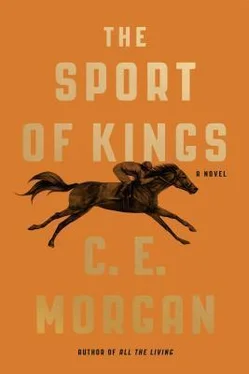“Reverend,” a voice said, “how you doing? You all right?”
They both looked up into a face as round as a moon. It belonged to a young man with a livid white scar that ran from the corner of his left eye all the way down to his mouth, bifurcating the lip. His lashes were spiky and glossy and made a charming show of his chestnut eyes. He was leaning down toward the Reverend’s face.
“Tired, young man,” said the Reverend.
“Aw, all right,” the man said, straightening up again. “I was thinking you was ill, the way you was sitting there.”
The Reverend reared back in indignation. “I ain’t been sick since 1973!”
“All right, Reverend, all right.” The man laughed and offered his hand. The Reverend reached out — Allmon saw his hand shake too as if from shyness — and grasped up the man’s hand in greeting. But he didn’t let go. Looking up, the Reverend said, “Young man, I ever tell you guilt’s something much, much worse than being under somebody’s boot? I ever tell you that?”
With his hand held prisoner in the Reverend’s, the man glanced up the busy street toward Liberty, then down toward the river, and grinned softly. He didn’t attempt to extricate his hand. “Yeah, seems like I heard that from you before.”
“And?”
The man sighed. “And you know I got to do what I got to do.”
“Really, now?”
“And you know where I’m about to go soon’s you let go my hand. If you ever gonna let go my hand.”
They laughed, and the Reverend released him.
Those slightly wary eyes were warm when they settled on him again. “But you praying for me, Reverend.”
“Of course.”
“And I thank you for that. ’Cause I ain’t got my mama to watch out for me no more.”
“Don’t thank me with words,” said the Reverend. “Thank me by quitting all this. You know you’re just playing right into their trap. You think this ghetto happened by accident? They use this ghetto like they use the police and the prison.”
“Oh, I know they use the prison, right.” The man chuckled ruefully.
“So, quit this then! Make your mama proud! Your mama walked with Jesus till the day her shoes wore out, and you know that’s the truth.”
But the man was just shaking his head gently. “Reverend, ain’t you never heard you can’t never go home again?” He smiled and then, with a shrug of the shoulders, he looked at Allmon and said, “Take care of this old man here. He all sorts of trouble.”
“I am trouble,” said the Reverend.
“See y’all later,” and the young man moved on down Sycamore, limping slightly, adjusting his pale blue drawers, which peeked out from his jeans, but not looking back.
The Reverend watched him go, and when the man turned left into the heart of Pendleton, he said, “God bless and keep him, that man’s already spent half his life on the new plantation. Unless he changes his ways, he’s gonna spend his whole entire life under state control. Kids with nothing got nothing to lose.” He looked hard at the four-story terracotta building across the street. His hand shook when he pointed. “You see that school right there? You know how many brothers was hiding themselves in tunnels under there trying to escape Kentucky? Levi Coffin lived right there, that’s right. Tunnels and cellars all over this neighborhood. We figured how to get out the South, but we can’t figure out how to get out their ghettos and prisons. But what you gonna do? If you can’t burn this whole country down and start over, what you gonna do?”
He sighed and rubbed his brow. “Child, don’t grow up and be no white man’s black man. Don’t grow up to be no … stereotype. God’s given you all the raw materials, and I gave you all my tools.”
“Come on, Grandpa,” said Allmon, and he stood and tugged on the man’s shoulder. The Reverend rose slowly, unsteadily, and when he reached out suddenly to right himself on Allmon’s shoulder, his weight was a grievous thing the boy almost stumbled under. He looked terrible and drawn, almost unsightly. Not how a man would ever want to look on a public street.
“You gonna be sick?” said Allmon, trying to urge him along.
The man shook his head silently, but with a vaporous look in his eye, as though he wasn’t really listening. They crossed the street but were moving slowly. When they were ten feet from the stoop, the Reverend said breathlessly, “Lord, I pray … ceaselessly.”
Allmon was trying to be patient, trying not to drag him forcibly up the stairs and into the house. He said, distractedly, “How you do that when you talking and walking and stuff?”
“Because,” said the Reverend, “I pray … with my body every minute … the day. How you treat the least … that’s how you pray … Jesus’ name…”
His voice drifted, and he stared down at the steps of his stoop pensively, as though they were a problem of philosophy he was trying to solve. He looked angrily at them, then longingly, then emptily. Then he proceeded to ascend them with a long moment spent on each. He leaned painfully on Allmon and panted audibly.
When they came into the dining room off the parlor, they startled the group of eight men who were current residents of the Reverend’s halfway house.
“Hey!” said one from the midst of the group, rising from his chair, a napkin tucked into the collar of his T-shirt. “We wasn’t intending to eat without you, but— Hey, Reverend, you all right? You sick?”
Allmon stood between his grandfather and the men around the table, and he held up one hand, even as he struggled to hold up the Reverend, barking in a voice he barely recognized, “Can’t you see the man’s tired?”
“But—”
“Y’all eat! Just leave him be!”
Whether stunned, or amused into silence by the little boy acting the man, they did as they were told, standing by as he hobbled the Reverend from the room. Someone said, “Well, goddamn.”
They passed the tiny bedroom, where Allmon and his mother slept on an air mattress when they spent the night, they passed the pink-tiled bathroom, they passed under the hall bulb, which had not had a fixture since the 1960s. But just before the bedroom door, the Reverend faltered, then stopped altogether and leaned away from Allmon against the cool, uncompromising wall. “I just figured it,” he said, and he placed both his hands gently on the wall as if it were a soft and lovely thing and not grimy from years of neglect.
“What?”
“God is love … and when you worship love, you worship God.”
Allmon reached out and drew him forcibly away from the wall and said, “You got to keep moving. The bed’s right here.”
It was like leading a blind man. Allmon could barely walk under the grievous weight of the old man’s life, but he felt strangely emboldened and strong too. He was growing inches taller in his mind, even as the man was shrinking before his eyes, the thick knees buckling so he keeled sideways onto the bed. He sighed a sigh that sounded like crying and rolled over onto his back. “I ain’t good,” he said. His hand reached out. “Never a good man by nature.”
He looked up at the dim ceiling, seemed confused, and then looked around, almost fearfully, as if he no longer recognized the room, until finally he found the anchor of the boy’s wide-eyed gaze. “But the Lord … he used me anyhow,” he said. “That’s the miracle.”
Allmon just stared into the depths of the man’s eyes, which were recessed and recessing, unknowable. The man looked and looked at him as if he’d never truly looked before, as if the boy were a strange species coming suddenly into existence in front of him. His eyes were full of wonder.
“You look so much like your momma.”
“No,” said Allmon, too sharply, drawing back. “I look like Daddy.”
Читать дальше
Конец ознакомительного отрывка
Купить книгу












